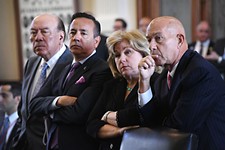On the Lege: A $156 Million Disaster
The Accenture scheme blows up in the state's face
Fri., March 23, 2007
Why it took the agency so long to cancel a nearly $1 billion contract with consulting firm Accenture is but one of many curiosities surrounding a disastrous attempt to revamp a delicate function of human services by replacing 2,900 state workers with privately operated call centers. The call centers were supposed to make social-services enrollment a breeze for needy Texans seeking food stamps, Medicaid, and children's health insurance.

The hastily launched project was fraught with computer quirks, poorly trained call-center workers, lost applications, and a dramatic, unintended drop in the number of children enrolled in the Children's Health Insurance Program. Meanwhile, client complaints piled up while lawmakers and stakeholders stepped up demands for the state to fire Accenture. In response, HHSC and Accenture officials insisted they were merely working out a few kinks and that things would be running smoothly in no time.
"I think they were just wedded to this plan," said Will Rogers, spokesman for the Texas State Employees Union. "They were bound and determined to make this happen, despite disastrous results. Finally it got to the point where they had to face reality and pull the plug."
Accenture, the Bermuda-based outsourcing giant, was the lead contractor of Texas Access Alliance, a group hired by the state in June 2005 to operate a portion of social services. The massive undertaking was billed as the magic bullet for improving delivery of human services with a new computer system, a reduced workforce, and fewer bureaucratic hurdles. The project grew out of a controversial component of 2003's House Bill 2292, which the Legislature passed at a time when the Republican majority was desperate to resolve a $10 billion budget shortfall without raising taxes. The bill led to the consolidation of a number of social-services and public-health programs under one agency – the Health and Human Services Commission. The bill's sponsor, former Rep. Arlene Wohlgemuth, had sold the legislation as a more efficient and cost-effective way of providing public assistance to those Texans "truly in need" – a thinly veiled directive to move toward trimming state welfare rolls and cutting social-services jobs.
If Health and Human Services Commissioner Albert Hawkins thought his long-running headache with the privatization experiment would disappear with the March 13 cancellation of the Accenture contract, he was wrong. Sen. Bob Deuell, R-Greenberg, and 29 other senators have since followed up with a letter to the state inspector general, requesting an in-depth probe into the procurement process that led to the Accenture deal, as well as a review of how HHSC's new computer system was developed and of the redesigned enrollment and eligibility system.
In seeking the investigation, the senators aren't necessarily looking for anything specific, said Deuell spokesman Todd Gallaher. "If the state canceled something this large," he said of the Accenture contract, "we want to know what happened."
Deuell, a physician and vice chair of the Senate Health and Human Services Committee, lends credibility to the campaign to get to the bottom of the privatization catastrophe. Rogers said, "Senator Deuell, for the last couple of years, has been one of the biggest critics of the concept of replacing skilled and knowledgeable state workers with privatized call centers." Rogers hopes that the investigation will also include a review of the HHSC procurement process. "The way the contract ended up going to Accenture really stinks," he said, referring to past news reports suggesting conflicts of interest between Accenture and HHSC higher-ups. "Somebody needs to look into the whole idea of cronyism and insider deal-making," he said.
Hawkins, nonetheless, is hard-pressed to acknowledge his mistake, even as members of the House Human Services Committee tried to squeeze an admission out of him last week. Committee Chair Patrick Rose, D-Dripping Springs, summed up the whole Accenture deal as a "$156 million disaster" – referring to the amount the state has already shelled out for the contract work.
Similarly, committee member Elliott Naishtat, an Austin Democrat and a House expert on social-services policy, says someone at the top needs to accept responsibility for the failure. "I would have appreciated an acknowledgement from our leadership – whether through Commissioner Hawkins or the governor – that the contract with Accenture and the Texas Access Alliance was a mistake," he said this week. The commission's initial business case analysis of the project provided an early indication of impending doom, Naishtat observed. "It was based on the assumption that a private contractor would be able to hire workers with only a rudimentary knowledge of human-services policies," he said. "An assembly-line business model does not work when dealing with human situations and human services."
All in all, the Legislature and HHSC are both to blame for the bungled project. The Lege passed HB 2292 over the objections of Naishtat and other Democrats who warned that it was "too much too fast." "I blame the Legislature for directing [HHSC] to move forward with such significant changes so quickly," Naishtat said. "But the commission is responsible for not doing a better job of planning and for not doing a better job of examining the Texas Access Alliance proposal and suggesting that it might not work." – Amy Smith
Voter Education
While some legislators are working to keep people away from the ballot box (see "Voter ID Bills," below), one state representative is trying to make sure that at least they will know why they were denied and to cut down on such denials in the future. HB 186 by Scott Hochberg, D-Houston, would require that an election officer who refuses to accept a would-be voter must provide that person with a signed statement listing all the reasons the voter was not accepted. A copy of the statement would be kept by the state, and the secretary of state would be required to follow up with a study of the documents and a biennial report to the Lege suggesting ways to reduce the number of eligible voters not accepted. The bill also would require that the rejected voter receive a statement explaining the circumstances under which he or she may cast a provisional ballot (a ballot that is kept sealed and only counted if it is later determined that the person is indeed eligible to vote).
"All of us have worked the polls, and all of us have worked elections," Hochberg told the House Elections Committee on Feb. 21, "and either while we're there or afterward, I've always had the experience of seeing people sort of come running out panicked, saying, 'I couldn't vote,' and they may give me a reason, or they may not. Some of them are angry because they thought they should be able to vote; others are in the wrong place or are confused about why they couldn't. And when it comes down to a dispute over this, it's often a he-said/she-said about what anybody was told, why they were denied. And typically, you don't try to resolve a controversy until much later. The provisional ballots have helped a bunch, as long as you know you can vote a provisional ballot."
On Monday the bill was sent to the Calendars Committee. – Lee Nichols
Capitol Briefs
• Legislation designed to remove roadblocks in the Children's Health Insurance Program was temporarily benched this week by an opponent who spotted a technicality in the bill's language. House Bill 109, sponsored by Rep. Sylvester Turner, D-Houston, would loosen some of the screws that lawmakers added in 2003, which left some 200,000 children without insurance. The proposal is opposed by a small but vocal minority, including Pasadena Rep. Robert Talton, who called out the technical error – a missing word in the text of the bill – when the measure came up for discussion on Monday. The legislation was pulled down for a quick fix and is expected to return to the House floor for a vote next week. It enjoys a fair amount of bipartisan support. – A.S.
• Both education committees – Senate and House – heard the bill on Tuesday to replace the exit-level Texas Assessment of Knowledge and Skills with a dozen end-of-course exams. Sen. Florence Shapiro, R-Plano, has suggested a two-year time line for implementing the tests, a time frame that has drawn some anxiety from the education community, although educators support the shift away from one shallow, high-stakes test. The bills – SB 1031 and HB 2236 – were left pending in both committees, awaiting amendments. – Kimberly Reeves
• Sen. John Carona, R-Dallas, laid out the session's omnibus homeland security bill, SB 11, on Wednesday morning. The creation of a statewide mutual aid system won high marks, along with plans to create more controls over the sale of prepaid phones. Also under the bill, the results of school district security audits would be exempted from the state's open-meetings law. – K.R.
Babies for Sale
When is selling a baby not selling a baby? When state Sen. Dan Patrick, R-Houston, says so, that's when. Indeed, in SB 1567, Patrick has specifically exempted his baby-selling "Adoption Incentive Program" from state Penal Code provisions that outlaw the practice. But Patrick's bill would offer $500 to women who agree to carry their unborn babies to term and offer them up for adoption. In other words, it's an incentive program for women who agree not to abort. (Under the program the state would only accept babies from "legal" citizens, so no illegal immigrant mothers need apply, thank you very much.) Under the bill, the $500 would be paid out "within 60 days" after the woman terminates her parental rights. As if the idea itself weren't creepy enough, Patrick would also amend the state's so-called "informed consent" to abortion law to require that abortion providers be the ones to make the state's baby-selling pitch to female patients seeking access to abortion. At press time, no committee hearing date had been set to consider Patrick's bill. – Jordan Smith
Ellis: Voter ID Bills Are Dead
In a strongly worded Wednesday morning press conference, Sen. Rodney Ellis, D-Houston, told his colleagues to forget about passing a so-called "Voter ID" bill, because the 11 Democrats in the Senate have all pledged to prevent such a bill from ever coming to the Senate floor. Due to the Senate's "two-thirds rule" – which says at least two-thirds of senators must approve legislation before it can come up for debate – those 11 are enough to kill a bill. "Like last session," Ellis said, "I have the votes to defeat plans to enact voter-intimidation laws."

House bills 218, 626, and 101 all would require a photo ID for voting, and all have been left pending in the Elections Committee. Ellis – joined by Reps. Lon Burnam of Fort Worth and Rafael Anchiá of Dallas (both Democratic members of the House Elections Committee); Rep. Senfronia Thompson, D-Houston; Sen. Leticia Van de Putte, D-San Antonio; and other legislators and advocates – said such bills would be better called "voter roadblock" bills that will only discourage minorities, the poor, disabled, and elderly from voting, while doing little to reduce voter fraud. In fact, he said, there is no evidence that such a requirement is even necessary.
"We've heard again and again the horror stories of dead voters casting the deciding vote; we've heard the term voter fraud thrown around," Ellis said. "Supporters of these efforts cannot provide one single instance in which people in Texas have voted using false identification. Not one. Last session there were those on the House side giving testimony about these horror stories yet not one documented case of fraud. This is a solution searching desperately for a problem. Can supporters of this bill give us evidence, any evidence, any proof of an individual voting using false ID? No, they can't. They only give us rhetoric. So like Joe McCarthy saying he had proof there were 57 card-carrying Communists in the State Department, you can make a heated charge but not back it up with one single fact."
But Ellis and his allies did marshal some facts of their own. Van de Putte said academic studies have shown that photo ID requirements will negatively impact 6 to 10% of the voting population without reducing fraud and charged that the nationwide voter ID movement is merely a partisan attempt to suppress Democratic voters. Ellis said career U.S. Justice Department staffers also back Van de Putte's stats, and Burnam charged that the requirement would be the "21st century poll tax." Speakers with groups such as the League of Women Voters and the Mexican American Legal Defense and Educational Fund made similar comments.
"We've seen this movie before, and we know how it ends," Ellis said. "It's time to drop this dangerous and divisive plan and concentrate on reforms that will actually improve our electoral system." – Lee Nichols
Retiring Our Investment in Darfur
Four state legislators have asked mutual-fund giant Fidelity Investments to "do the right thing" and divest its holdings in Sudan-linked oil companies, a major funding source for the Sudanese government-backed genocide in Darfur. The lawmakers – Sen. Rodney Ellis and Reps. Lon Burnam, Helen Giddings, and Corbin Van Arsdale – are carrying legislation that seeks to divest state holdings in companies doing business in Sudan. Ellis' Senate Bill 247 sailed out of the Senate Tuesday with unanimous approval. House action is pending.
The bill follows a "targeted divestment" model that would not directly impact Fidelity, even though it is a leading investor in PetroChina and Sinopec, two oil concerns with major financial stakes in Sudan. The Boston-based investment firm has rejected worldwide calls and a national campaign (www.fidelityoutofsudan.com) urging them to sever its Sudan ties. In their letter sent last week to Fidelity Chairman Edward C. Johnson III, the legislators said they were "deeply dismayed and disappointed" by the company's refusal to divest. Realistically, the letter writers don't expect Fidelity to change its position, but they signed off with a Texas-style parting shot: "Please know that the eyes of Texas are most definitely upon you." As it happens, Fidelity is expanding its presence in Texas. Gov. Rick Perry, who supports the bill, recently awarded the firm an $8.5 million business grant to create 1,500 new jobs in Tarrant County.
The new law would require the state Employees Retirement System and Teacher Retirement System to take stock of their Sudan-related holdings and move toward divestment. The retirement groups have not taken a position on the legislation, but it's safe to say that the funds' money managers don't relish taking a big financial hit for "doing the right thing." TRS has estimated a resulting $51 million loss in fiscal 2008. The larger ERS has not yet reviewed its holdings, but its losses would be substantially greater. – A.S.
Got something to say on the subject? Send a letter to the editor.
Read more of the Chronicle's decades of reproductive rights reporting here.








